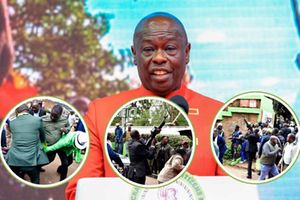
Nominated Senator Gloria Orwoba.
President William Ruto’s United Democratic Alliance (UDA) decision to expel nominated senator Gloria Orwoba has once again revived talks of the long and winding appeal mechanism that has in the past been exploited by members to remain in Parliament.
Orange Democratic Movement (ODM) of Raila Odinga, Jubilee Party of Uhuru Kenyatta, as well as the now-defunct Amani National Congress, have in the past failed to kick out rebel lawmakers.
The decision to expel Senator Orwoba was reached by the party’s National Executive Committee, which ratified a report by its Disciplinary Committee, which accused the vocal senator of violating the Political Parties Act that prevents party members from promoting ideologies of a rival outfit.
“The National Executive Committee (NEC) of the Party adopted and ratified the Disciplinary Committee's decision. Accordingly, Sen. Gloria Orwoba ceases to be a member of the UDA Party.
Consequently, she no longer enjoys any privileges accorded to party members nor is she authorised to represent or act on behalf of the Party in any capacity,” UDA Secretary General Hassan Omar Hassan said.
“While the UDA Party upholds the values of freedom of expression and association as enshrined in the Constitution of Kenya 2010, fidelity and loyalty to party ideals are fundamental to its constitution and to further consolidate our multiparty politics by strengthening political parties. Gloria Orwoba cannot, therefore, continue to play for two political teams simultaneously.”
The decision is, however, set to kick off a long and winding appeal mechanism that could see Ms Orwoba remain in office.
The High Court had already issued an order stopping the party from proceeding with her disciplinary hearing.
“I am being accused of being a Kisii or coming from the Gusii community. I cannot change that. It appears that the allegations that are being made are that I stopped being a Kisii. I come from my community,” Senator Orwoba said when she addressed the media outside UDA headquarters last Friday.
She made the remarks in the presence of her legal team when she presented the High Court order to the disciplinary committee.
In September 2023, Mr Odinga’s ODM sought to have MPs Elisha Odhiambo (Gem), Caroli Omondi (Suba South), Gideon Ochanda (Bondo), Phelix Odiwuor (Lang’ata), and Kisumu Senator Tom Ojienda expelled and struck out of the party’s membership roll.
The MPs were accused of supporting UDA. Their removal as party members, however, stalled after they obtained a court order against the Orange party.
And in February 2021, Jubilee expelled nominated senators Isaac Mwaura, Mary Seneta, Falhada Dekow Iman, Naomi Jillo Waqo, Victor Prengei, and Millicent Omanga. The senators were perceived as allies of then DP Ruto.
The decision made by the faction led by then President Uhuru Kenyatta was met with court battles that saw the members continue to serve.
First, the six senators who were allied to then Deputy President William Ruto quickly proceeded to the Political Parties Disputes Tribunal (PPDT) that put a stay on their removal. The matter later moved to the High Court. It dragged on in the courts until they completed their terms.
Similarly, previous attempts by ODM and ANC, formerly led by Prime Cabinet Secretary Musalia Mudavadi, suffered the same fate, pointing to a legal framework that makes it nearly impossible to kick out a member from a party.
Attempts by Mr Odinga in 2019 to kick out then Malindi MP Aisha Jumwa were thwarted by the PPDT. She served until the end of her term despite her decision to support President Ruto’s campaigns in the run-up to the 2022 elections.
In 2017, ODM unsuccessfully expelled then then-governors Ukur Yatani (Marsabit), Salim Mvurya (Kwale), Deputy Governor Joash Maangi (Kisii), MPs Steven Kariuki (Mathare), Mpuru Aburi (Tigania East), Gideon Mung’aro (Kilifi North), Mustafa Iddi (Kilifi South), Cyprian Kubai (Igembe Central), and James Rege (Karachuonyo) for backing Mr Kenyatta’s re-election.
Other rebels that were targeted for expulsion in the run-up to the 2017 General Elections were Samuel Arama (Nakuru Town West), John Waluke (Sirisia), nominated MP Mwaura, and Kwale County Woman Representative Zainabu Chidzuga.
In the 2017 bid to expel rebels, ODM was successful, but the Independent Electoral and Boundaries Commission (IEBC) could not call for by-elections since the 2017 polls were a few months away. The law bars IEBC from holding any by-election within 90 days of the General Election.
In 2019, Mr Mudavadi’s attempt to kick out the then ANC nominated MP Godfrey Osotsi (now Vihiga Senator) failed. The court ruled in his favour.
In a previous interview, Registrar of Political Parties Anne Nderitu said the tedious process is meant to ensure fairness to both the political party and the errant members.
“It is a quasi-judicial process and has to fulfil the principle of our Constitution and the Political Parties Act,” said Ms Nderitu.
“The law cuts both ways. There must be fairness for the political parties and to the accused members,” she told the Nation.






